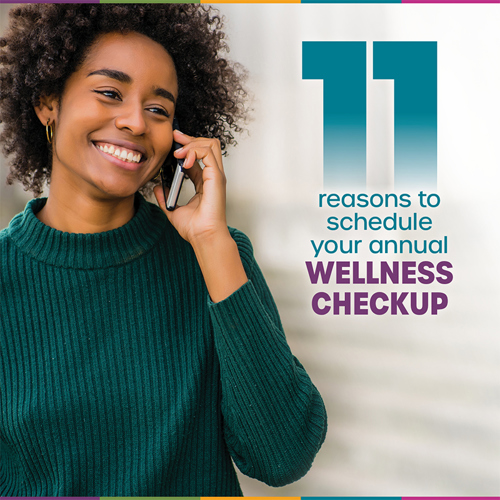Women know life moves quickly. New partners, new jobs, different opportunities, and circumstances can come in and out of your life impacting everything from your current situation to your future life plans. On top of that, women’s healthcare is always changing. There are new options for birth control that can fit your active lifestyle, which is why it’s important to make sure your healthcare provider is aware of your reproductive plans and goals.
The American College of Obstetricians and Gynecologists recommends a well-woman checkup every year.
 11 reasons to schedule an annual well-woman checkup:
11 reasons to schedule an annual well-woman checkup:
- Birth Control – Learn more about choosing the right birth control method for you. Some examples include the birth control pill, intrauterine device (IUD), patch, condom, or implant.
- Cancer Screening – Learn more about breast cancer, colon cancer, or other types of cancer.
- Vaccinations – Get vaccinations against the flu, human papillomavirus (HPV), and more.
- Health Screening – Get screened for high blood pressure, diabetes, bone density for osteoporosis, and more.
- Depression Screening – Depression is a common but serious illness. Depression can be mild, moderate, or severe. To diagnose depression, your obstetrician-gynecologist or other health care provider will discuss your symptoms, how often they occur, and how severe they are.
- Sexually Transmitted Infections Screening – Sexually transmitted infections (STIs), such as chlamydia, gonorrhea, and genital herpes, are infections that are spread by sexual contact.
- Concerns About Sex – Discuss what happens during intercourse, pain during sex, hormonal changes that change interest or response to sex, or different forms of sex.
- Weight Management – Learn about body mass index (BMI), exercise, obesity, diet, surgery, and health problems associated with being overweight.
- Issues with Your Menstrual Period – Discuss premenstrual syndrome (PMS), painful periods, your first period, heavy bleeding, or irregular periods.
- Preconception Counseling – If you are planning to become pregnant, it is a good idea to have preconception counseling. Your obstetrician-gynecologist or other health care provider will ask about your diet and lifestyle, your medical and family history, medications you take, and any past pregnancies.
- Other Reasons – Get help with menopause symptoms, urinary incontinence, getting pregnant, or relationship problems
